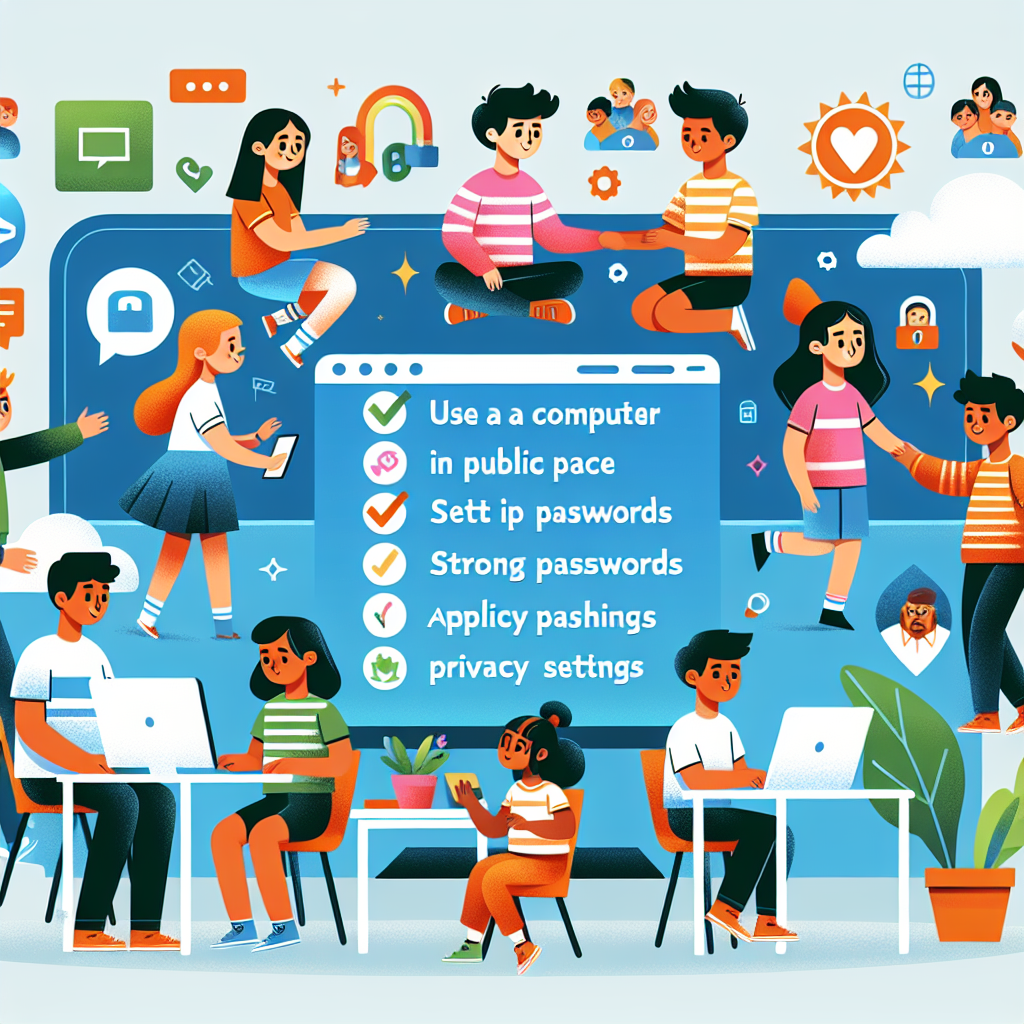In today’s digital age, children are increasingly exposed to social media platforms that can have both positive and negative effects on their well-being. It is crucial for parents and caregivers to encourage healthy social media habits for kids in order to protect them from potential harm. By teaching children the importance of balance, mindfulness, and critical thinking when engaging with social media, we can help them develop a positive and responsible relationship with technology. This guide will explore practical tips and strategies to promote healthy social media habits for kids, empowering them to navigate the online world safely and confidently.
Understanding the Impact of Social Media on Children

Social media has become an integral part of children’s lives, with platforms like Instagram, TikTok, and Snapchat shaping their perceptions and behaviors in various ways. It is crucial for parents and caregivers to recognize the profound impact that social media can have on children and adolescents, and to take proactive steps to mitigate any potential negative effects.
Effects of excessive social media use on mental health
- Research has shown that excessive use of social media can contribute to feelings of anxiety, depression, and loneliness in children.
- Constant exposure to curated and often unrealistic images and lifestyles on social media can lead to feelings of inadequacy and low self-worth.
- The constant need for validation through likes and comments can create a cycle of seeking external approval for self-esteem, leading to a negative impact on mental well-being.
Influence of social media on self-esteem and body image
- Social media platforms are inundated with images of idealized beauty standards, which can distort children’s perceptions of their own bodies.
- Comparison to heavily filtered and edited images online can fuel body dissatisfaction and unhealthy behaviors such as disordered eating or excessive exercising.
- The pressure to conform to these unrealistic standards can harm children’s self-esteem and self-confidence, impacting their overall mental health.
Importance of setting boundaries and guidelines
- Establishing clear boundaries around social media use, such as limiting screen time and setting specific times for usage, can help children maintain a healthy balance.
- Encouraging open communication about social media experiences and promoting critical thinking skills can empower children to navigate online spaces responsibly.
- Teaching children about the importance of privacy settings, online safety, and respectful communication can help them develop positive digital habits and protect themselves from potential harm.
Identifying Positive and Negative Social Media Behaviors
Positive Interactions on Social Media
- Connecting with Friends and Family: Social media platforms provide children with the opportunity to stay in touch with friends and family members, especially those who live far away. This can help foster relationships and maintain connections that may not be possible through other means.
- Sharing Creativity and Talents: Kids can use social media to showcase their talents, whether it’s art, music, writing, or other hobbies. This can boost self-esteem and encourage creativity in a supportive online community.
- Access to Educational Resources: Some social media platforms offer educational content that can supplement learning outside of school. Kids can engage with informative videos, articles, and discussions that enhance their knowledge and skills.
Negative Behaviors on Social Media
- Cyberbullying: One of the most concerning negative behaviors on social media is cyberbullying. Children may experience harassment, threats, or exclusion online, leading to emotional distress and low self-esteem. It’s crucial for kids to recognize signs of cyberbullying and seek help from trusted adults.
- Exposure to Inappropriate Content: Social media platforms may contain content that is not suitable for children, including violence, explicit language, or misinformation. Parents should educate their kids on how to navigate such content responsibly and report any inappropriate material they encounter.
- Privacy Concerns: Kids may unintentionally share personal information on social media, putting them at risk of privacy breaches and potential exploitation. Teaching children about the importance of privacy settings and online safety measures can help mitigate these risks.

Establishing Healthy Social Media Habits
Setting Screen Time Limits
It is crucial for parents to establish and enforce screen time limits for their children when it comes to using social media platforms. Here are some key points to consider:
-
Importance of limiting screen time for overall well-being: Excessive screen time has been linked to various health issues, including eye strain, poor posture, disrupted sleep patterns, and decreased physical activity. Setting limits helps in promoting a healthier lifestyle and ensuring that children engage in a well-rounded range of activities.
-
Implementing structured breaks and offline activities: Encouraging children to take regular breaks from social media and engage in offline activities such as reading, playing outside, or pursuing hobbies can help in reducing screen time. Setting specific time slots for social media usage and incorporating breaks in between can also prevent overexposure.
-
Utilizing parental controls and monitoring tools: Parents can make use of parental control features available on devices and social media platforms to limit the amount of time children spend online. These tools allow for setting restrictions on usage duration, blocking certain apps or websites, and monitoring the content accessed. By actively supervising and regulating screen time, parents can help children develop healthier social media habits.
Promoting Positive Online Interactions
Establishing Healthy Social Media Habits
In promoting positive online interactions, it is essential to focus on fostering a safe and respectful digital environment for children. Here are some key strategies to encourage positive behavior in online communication:
- Encouraging kindness and empathy in digital communication
- Emphasize the importance of treating others with respect and empathy, even in the virtual world.
- Encourage children to think about how their words and actions online can impact others.
-
Teach them to consider the feelings of their peers before posting or commenting on social media platforms.
-
Teaching children digital etiquette and respectful behavior
- Educate children about the basics of digital etiquette, such as using appropriate language and tone online.
- Set clear guidelines on what is considered respectful behavior in online interactions.
-
Encourage children to think before they post and consider the potential consequences of their online actions.
-
Discussing the importance of online privacy and safety
- Educate children about the significance of safeguarding their personal information online.
- Teach them to be cautious about sharing personal details or photos on social media platforms.

- Discuss the risks of interacting with strangers online and emphasize the importance of privacy settings on social media accounts.
Educating Kids on Media Literacy and Critical Thinking
Developing Critical Evaluation Skills
Teaching children to question and verify information online is a crucial aspect of developing their critical evaluation skills. In today’s digital age, where information is readily accessible, it is essential for kids to learn how to discern between accurate and misleading content on social media platforms. By instilling the habit of fact-checking and cross-referencing information, children can better navigate the vast sea of online data.
Recognizing fake news and misinformation is another key skill that children should acquire. With the proliferation of misleading content online, kids need to be equipped with the tools to identify red flags such as sensationalized headlines, lack of credible sources, and biased reporting. By teaching children to be skeptical of information that seems too good to be true or is designed to evoke strong emotions, parents and educators can help them become more discerning consumers of online content.
Promoting critical thinking to discern credible sources is essential in fostering healthy social media habits. Encouraging children to seek information from reputable sources, such as established news organizations or peer-reviewed journals, can help them develop a habit of consuming trustworthy content. By emphasizing the importance of verifying the credibility of sources and looking for corroborating evidence, parents and educators can empower children to make informed decisions about the information they encounter online.
Understanding Digital Footprint and Online Reputation
In the digital age, children must grasp the concept of a digital footprint: the trail of data left behind by online activities. This footprint comprises all the information that can be found about an individual online, including posts, comments, photos, and interactions.
Discussing the permanence of online actions and posts
- Emphasize to children that once something is shared online, it can be challenging to erase completely.
- Explain that even deleted posts can potentially resurface through screenshots or digital archives.
- Encourage critical thinking before posting to prevent future regrets.
Teaching kids to curate a positive digital footprint
- Guide children on how to showcase their best selves online by sharing positive content.
- Discuss the importance of privacy settings and being mindful of who can view their posts.
- Encourage them to think about the long-term implications of their online actions.
Addressing the implications of online behavior on future opportunities
- Explain to children that potential employers or universities may review their online presence.
- Discuss how inappropriate content or behavior online can impact their reputation and opportunities.
- Encourage responsible online conduct to safeguard their future prospects.
Encouraging Open Communication and Support
Creating a Safe Space for Discussions
When it comes to fostering healthy social media habits in kids, creating a safe space for discussions is crucial. This involves establishing an environment where children feel comfortable sharing their online experiences, both positive and negative, without fear of judgment or retribution. By encouraging open dialogue and providing unwavering support, parents and caregivers can help children navigate the complexities of the digital world with confidence and resilience.
Key Points to Consider:
-
Fostering open dialogue about social media experiences: Initiate conversations with your children about their online activities regularly. Ask them about the platforms they use, the content they engage with, and any interactions that may have made them uncomfortable. By showing genuine interest and actively listening, you can create a foundation for honest communication.
-
Encouraging children to seek help for any online concerns: Teach children that it’s okay to ask for help when they encounter troubling situations online. Whether it’s cyberbullying, inappropriate content, or privacy issues, children should feel empowered to reach out to a trusted adult for guidance and support. Emphasize that seeking help is a sign of strength, not weakness.
-
Providing guidance without judgment or punishment: When children confide in you about their social media experiences, respond with empathy and understanding. Avoid criticizing or punishing them for mistakes they may have made online. Instead, focus on offering constructive guidance and helping them learn from the situation. By creating a supportive environment, you can build trust and encourage ongoing communication about social media usage.
Seeking Professional Help When Needed
Encouraging Open Communication and Support
In certain cases, it may be necessary to seek professional help to address any negative impact or potential addiction to social media among children. It is crucial for parents and caregivers to be vigilant and recognize signs that indicate a need for professional intervention. Some signs to watch out for include:
- Increased isolation or withdrawal from real-life social interactions
- Heightened irritability or aggression when online time is limited
- Neglect of responsibilities such as schoolwork or household chores due to excessive social media use
When these signs are observed, it is important to take proactive steps to address the situation. Seeking help from mental health professionals or counselors can provide the necessary support and guidance to navigate the complexities of social media and its impact on a child’s well-being.
Prioritizing the mental and emotional well-being of children should always take precedence over their online presence. By addressing any underlying issues with the help of professionals, parents can ensure that children develop healthy habits and relationships with social media platforms.
FAQs: Healthy Social Media Habits for Kids
What are some tips for parents to help their children develop healthy social media habits?
It is important for parents to set guidelines and boundaries for their children’s social media usage, such as limiting screen time, monitoring their online activity, and encouraging face-to-face interactions with friends. Parents should also educate their children about the potential dangers of social media and teach them how to use it responsibly.
How can parents help their children avoid cyberbullying on social media?
Parents should have open and honest conversations with their children about cyberbullying, including what it looks like and how to respond if they experience it. Encourage children to report any bullying behavior to a trusted adult and to block or unfollow anyone who is being hurtful online. Parents should also monitor their children’s online interactions and be aware of any changes in behavior that may indicate they are being bullied.
What are some signs that a child may be spending too much time on social media?
Some signs that a child may be spending too much time on social media include neglecting responsibilities, a decline in academic performance, withdrawal from in-person social interactions, and changes in mood or behavior. Parents should be aware of these red flags and intervene if necessary to help their child develop a healthier balance between online and offline activities.
How can parents help their children maintain a positive self-image while using social media?
Parents can help their children maintain a positive self-image by encouraging them to post authentic content, rather than seeking validation through likes and comments. Parents should also teach their children to be critical of the images and messages they see online and to not compare themselves to others. Building self-esteem and confidence in offline activities can also help children feel more secure in their online interactions.